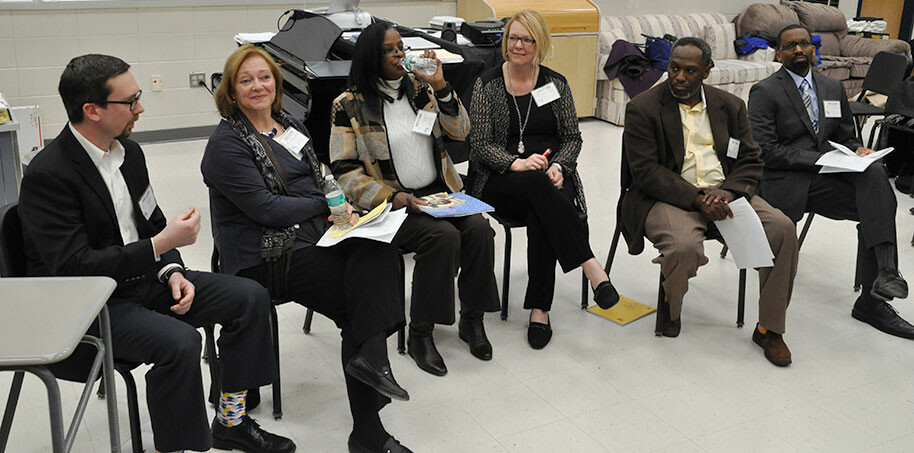Tales and Lessons of Vitality and Transformation
By Melissa Lauber
UMConnection Staff

In today’s world of church growth, vitality is something to which congregations aspire. But in the Washington Region, five unique congregations have stopped striving to be vital and begun to simply live out, in the best ways they know, the Great Commandment and the Great Commission.
They love their neighbors and make disciples.
On March 5, Christie Latona, the Washington Region strategist, gathered the pastors of these churches together at Leadership Days for a unique panel discussion. In the music room of Reservoir High School in Fulton, they shared glimpses into the “crazy growth” God has brought them and the shifts their congregations had to navigate to get back in synch with God.
At the outset, Latona explained that vital churches “love, liberate, lead and launch,” all within their own distinct contexts.
The word is ‘passion’
 Two years ago, the Rev. Armon Nelson, became the pastor of Mt. Vernon UMC in Washington, D.C. The church is situated in a community with one of the highest rates of unemployment in the nation. He believes God had a hand in his being there.
Two years ago, the Rev. Armon Nelson, became the pastor of Mt. Vernon UMC in Washington, D.C. The church is situated in a community with one of the highest rates of unemployment in the nation. He believes God had a hand in his being there.
Nelson spent six months surveying the poverty-struck community and asking profound questions of the congregation. Among them: Do you want a pastor or do you just want to pay someone to do your ministry?
He asked the trustees to take the locks off many of the doors. Noting that the church was in a “food desert,” he engaged the congregation in starting a hot-meals program and partnered with Metropolitan Memorial UMC, a more affluent church in North West D.C. More than 150 come each week to eat.
Nelson asked everyone: How can we serve you, believing that in serving, the church was honoring God. He also set about creating a welcoming community, offering vibrant worship that focused on healing and celebrating the good things happening in people’s lives.
“We understood that together we needed to become a witnessing community,” he said. “We witness by our lifestyle.”
The word is ‘community’
 The Rev. Mary Ka Kanahan pastors St. John United Church, a unique interfaith experiment begun in Columbia, Maryland in 1969. Today, the 100-member United Methodist and Presbyterian congregation
The Rev. Mary Ka Kanahan pastors St. John United Church, a unique interfaith experiment begun in Columbia, Maryland in 1969. Today, the 100-member United Methodist and Presbyterian congregation
When she arrived three years ago, the church was in decline. Kanahan reminded them that United Methodist pastors are appointed to parishes and communities, not just churches. In the past 15 to 18 months, members have stopped focusing inward and realized that the church exists to serve the community,
Developing relationships with people in the community is important, she said, especially given the fact that the neighborhood around the church will be experiencing growth, with more than 1,700 units of luxury apartments being built nearby soon.
In addition to assessing and meeting the needs of the community, the congregation has been working on revitalizing worship, including more global music, and nurturing small group studies and ministries. About 70 percent of church members are in a small group.
The word is ‘spiritual’
 The vibrancy of Goshen UMC in Gaithersburg is the result of a merger of two small African-American churches and the diligence of its pastor, the Rev. Shawn Wilson, who ensures the 300-member congregation is grounded in spiritual disciplines.
The vibrancy of Goshen UMC in Gaithersburg is the result of a merger of two small African-American churches and the diligence of its pastor, the Rev. Shawn Wilson, who ensures the 300-member congregation is grounded in spiritual disciplines.
Born and raised in a family brimming with United Methodist pastors and ordained in the Eastern Pennsylvania Conference, Wilson is in his fifth year at Goshen.
“What’s helped the church grow?” Wilson is frequently asked. He’s definitive in his answer. “We focus on the means of grace.” Prayer, Bible study and immersing lives in the Gospel is critical. “If we are to be agents of transformation in our communities and in our families, we have to be transformed as disciples,” Wilson said.
God’s word can bring about this transformation. “When God spoke,” he said, “what was chaos, became cosmos.”
Sharing this word in a faith community provides a narrative framework for people. Bible study and prayer lead to service, Wilson said.
The question is, he asks, “how do we pay attention to what God is saying?”
The word is ‘life-bringing’
 At first blush, the 104-year old Chevy Chase UMC, in an affluent Washington suburb, might not have
At first blush, the 104-year old Chevy Chase UMC, in an affluent Washington suburb, might not have
But rather than stepping in as a new pastor and working to immediately fix things, the Rev. Kirkland Reynolds led his congregation through an analysis to discern “what would God have us do. What’s working? What brings life?”
In their assessment, the congregations noted two unique ministries: a Saturday morning citizenship class in which church members mentored and supported immigrants preparing for their exam; and Kids on Purpose, a ministry that invites nonprofits to the church to enable children to work together in mission during the Sunday School hour.
Both ministries involved no staff time and not one penny of the budget, Reynolds said. Recognizing these ministries and, through an Appreciative Inquiry process, being open to
We now have a balanced budget, Reynolds reported; “25 percent of people in worship are under 18 and, most important, we actually believe we’re alive. We’re different now.”
The word is ‘being’
 Abnormal was normal at Community UMC in Washington,
Abnormal was normal at Community UMC in Washington,
One evening during a revival in a tent outside the building, a completely random series of events stopped a girl from being sold into human trafficking. Another day, Chase-Sands was sitting in her car outside the church, when a man approached with a gun, intending to shoot. Only the bystanders’ cries of “stop, that’s the pastor!” made him lower the gun.
“In ministry, you have to know what you’re getting into,” said Chase-Sands. “Hope was missing when I got there.”
She began her ministry by listening to the Holy Spirit. “God said, ‘love them and help them with their grief.’” She did that the only way she could, by authentically loving people.
“I told them, ‘Community is our name and our mission,’” she said. In this ministry, you have to be. Be. Be. Be. Being is believing.”
Drawing inspiration from Howard Thurman’s book “Jesus and the Disinherited,” Chase-Sands found ways to be present in the community to work outside of traditional expectations. “Ministry has to be an adventure,” she said, “something you have a passion for. I’m in awe of God all the time.”
New realities
The participants listening to the panel discussion had several questions as they try to figure out how to take their next best step as they move from the “wilderness” to creating vitality.
The wilderness, the panelists assured them, was not a terrible place to be.
“The wilderness can be a place of extreme possibility,” Wilson said. “God gave us the law in the wilderness, that was better even than manna. God gives life in the wilderness.”
And, the panelists added, “when things die in the
They also encouraged others seeking transformation to stay faithful and
“Make sure what you’re doing is fun,” Reynolds said. “Have more fun.”

